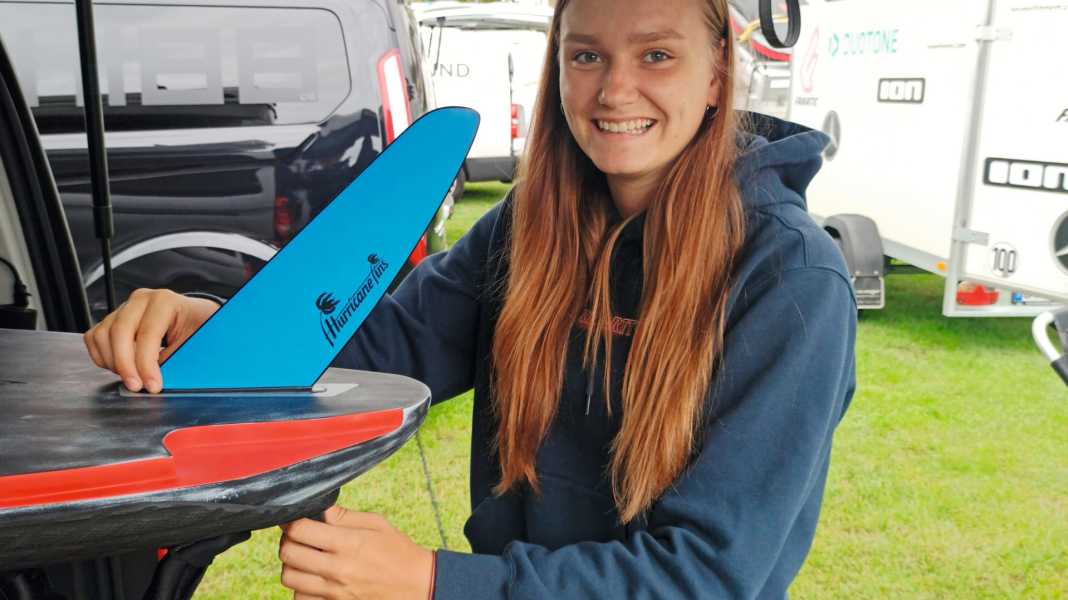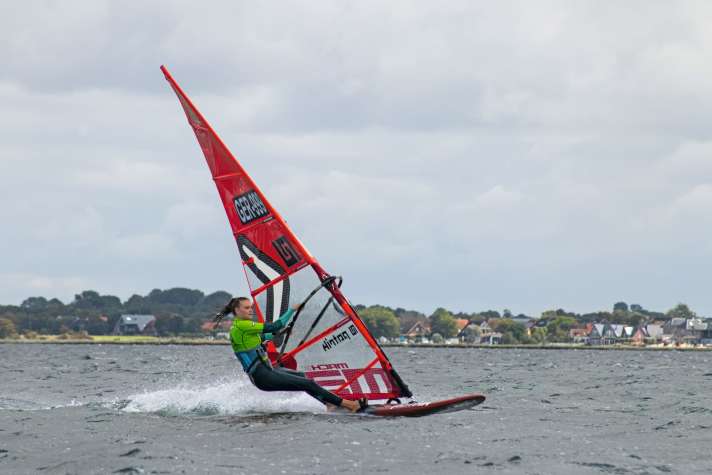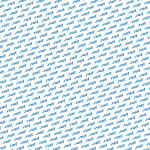
You're only 17 years old, but you've already competed in speed championships and also in the iQFOiL class. When did you start surfing and how did you get into windsurfing?
My father is a windsurfer himself and took me on the board from an early age. I've been surfing since I was six years old.
Where are you from and where did you learn to surf?
I grew up in Hamburg and learnt to surf in Denmark, Fehmarn and at the Kids Camp in Alaçati, Turkey.
When did you start foiling and what fascinates you most about it?
After foiling became an Olympic sport for 2024, the search was on for ambitious women. So I foiled for the first time in the Schleswig-Holstein state squad in March 2020. What I find interesting about foiling is that you can have a lot of fun even in light winds. You can also sail all courses even in light winds, although we still sail the iQFOiL with the standard sail of eight square metres at 25 knots, which is tough sometimes.
Foiling is particularly interesting in light winds. But you also take part in speed races at Hack. What do you enjoy more?
Foiling is also interesting in up to 25 knots, but then requires a lot of experience. Speed races are typically ridden with fins on slalom boards or speed boards in strong winds. You push more directly and have contact with the water, which makes you experience the rush of speed even more. That's also great.

Do you ever ride waves or freestyle?
That's somehow not my thing. What fascinates me about windsurfing is the speed.
You need a lot of different equipment for speed, slalom or foil. How do you organise this, including financially?
I'm still a student. I was lucky enough to find a board sponsor in Patrik who supports me with my speed surfing. Surfshop Fehmarn supported me with the sails. The iQFOiL equipment is really an investment that my parents have made for me. I'm currently looking for more sponsors to finance future trips to events.
You are now in the state squad of the Schleswig-Holstein Sailing Association and have moved to Kiel. You also go to school there. Why don't you describe how your life has changed as a result and what your daily routine looks like?
My life has changed a lot since I've been living in the sports boarding school at the Olympic Centre. I have a lot more water time and sport takes centre stage. In the mornings, I go to sixth form as normal, while training and sport take centre stage in the afternoons. I enjoy living with other ambitious water sports enthusiasts and it helps me to progress. We are very well looked after, with food, physio and coaching, which is really helpful when school is cancelled due to regattas or training camps.
What are your own short-term goals and does the association have any plans for the future?
I want to get to the top in speed surfing. In foiling, it's all about gaining more regatta experience. The plan is to take part in international regattas next year.
Your big goal is the Olympic Games. In the end, however, only one female athlete qualifies every four years. There are still a few women ahead of you at the moment. When do you think you will be able to attack and overtake them?
The others have years of regatta experience. I just don't have that yet. I can still work on my tactics and manoeuvres. Speed surfing can still give me an advantage when foiling.

You were currently the fastest woman at the German Speed Windsurfing Championships, but were not honoured as German champion. What was going on there?
First of all, I was pleased to be the fastest woman and to be in the midfield in the men's race. What annoys me is that there probably won't be enough women at the start in the next few years either, so the women will always be denied the championship title.
What is your plan if the Olympics don't work out after all? Would you like to race in the World Cup then? You're obviously fast.
As I'm very young, the 2028 Olympics is also a goal for me. There's still some time until then. I also find the World Cup interesting, but the Lüderitz Speed Challenge also appeals to me.
There are currently very few women in Germany who seriously take part in regattas. Why do you think that is, and how could more women and girls be motivated to take part?
The sport is tough (weather, equipment, trimming forces, etc.), it takes a long time before you can really surf with fun and speed. The iQFOiL has a good influx of women. There are separate women's fleets here. At the DWC in St. Peter-Ording, I was the only woman racing in the men's field. You can certainly get a lot of girls and women interested in the sport by organising surf camps. There is still room for improvement when it comes to equipment.
What are your future plans besides windsurfing?
Regardless of what happens with windsurfing, it is important for me to study in order to have a professional future. At the moment, my plan is to study sports science after my A-levels. I would like to stay in Kiel.
FACTS
- Born: 16.1.2004
- Place of residence: Kiel
- Profession: Student
- Height/weight: 178 cm/62 kg
- Surfing since: 2010
- Regatta debut: 2020
- Successes: German Speedbattle 2019 1st place ladies inland lake, 2nd Generation Cup, German Speedbattle 2020 1st place ladies foil, 3rd place U16 mixed, 2021 DWC St. Peter-Ording best lady racing, German Speed Championship 2021 1st place ladies, 2nd place U21 mixed, fastest run overall ladies
- Favourite spots: Fehmarn Orth, Kiel Schilksee
- Favourite discipline: Speed and foil
- Hobbies: Wakeboarding, skiing
- Sponsors: Patrik, Surfshop Fehmarn
- Instagram: luisa.ger999

